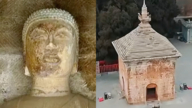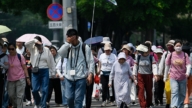【新唐人2014年02月26日讯】中共当局披露,广东运动饮料公司“健力宝”前总裁张海,涉违法减刑案,共查处24人。中共正在启动缉拿张海及他的女友的追捕引渡程序。而中国民间对“特权阶层”假借减刑、假释等大搞黑幕交易的行为大感不公,民众要求当局对类似案件公开审理的呼声高涨。25号,中共公布:过去5年来,68776人(日平均约30人)涉入违法减刑、假释、暂予监外执行案。
2月24号,中共最高检察院公布:截至今年1月,检察机关对张海违法减刑系列案件,立案追究了涉及司法行政、监狱等系统的24人。目前,张海和女友已逃往境外,追捕引渡程序已经启动。
大陆媒体报导说,2005年3月,张海因涉嫌挪用资金而被广东佛山市公安局刑事拘留﹔2007年2月,佛山市中级法院以职务侵占罪、挪用资金罪两项罪名,判处张海有期徒刑15年。
张海被收监后,他的女友从中运作,串通和贿赂相关人员,2011年初,服刑6年后的张海悄然出狱,逃往海外。
南京“东南大学”法学院教授张赞宁指出,像张海这种“特权阶层”,假借减刑、假释、保外就医等名目,大搞黑幕交易,或者司法人员滥用职权帮犯罪人员脱罪的现象,在当今中国非常普遍。
南京“东南大学”法学院教授张赞宁﹕“一般来说违法行为都是窝案比较多,都不是一个人所能作案的,都是一伙人,现在引渡的话,我们国家跟有些国家有引渡关系的,那两个人肯定能引渡回来,如果没有引渡关系的那也要看情况。”
大陆律师唐荆陵:“即使没有(引渡)协议,通过个案外交方式也有解决的可能,只不过,世界上和中国有司法协议的国家数量很少,所以中国有大量的贪官,或者有大量的人逃到海外去。”
2011年,中国社会科学院调研资料曾披露:从90年代中期以来,中共外逃、失踪官员高达16000——18000人,携带款项达8000亿元人民币。
2014年的《法治蓝皮书》预测,今年腐败公职人员外逃现象可能加剧。蓝皮书建议加大对“裸官”以及其他可能外逃公职人员的监管。
随着外逃人员和违法减刑案的频频出现,中国民间要求公开公正审理类似案件的呼声高涨。日前广东高院在网上公示了733例违法减刑案。2月25号,最高检察院数据显示,过去5年间,检察机关共纠正涉及68776人的减刑、假释、暂予监外执行案。
这么庞大的数字,再次引发舆论对中共司法腐败,以及官商勾结大搞权钱交易的关注。
唐荆陵:“以前减刑、假释这一块,确实在整个刑事诉讼法里面,规定的条款很少,他们就通过这里的很多官员犯罪,或者说是包含黑社会犯罪,他们利用政府内的一些关系,把人弄出来,就是所谓的保人,或者说去买人头,这都属于司法贪败的一种很普遍的现象。”
由于花钱“赎身”的情况已泛滥成灾。日前,中共政法委出台了所谓“严格规范减刑、假释、予以监外执行”的指导意见,和“切实防止司法腐败”的指导意见等。
唐荆陵指出,中共在立法方面更明确、更严格,对利用“减刑、假释”等漏洞谋取私利,放纵犯罪的行为有所约束,但作用不大。
唐荆陵:“因为中国很多事情不是没有法律去规治,而是属于政府权力失效了,因为这种普遍的腐败,官员彼此之间的勾结,法律上的条文处于一个失效的状态,而不是说没有法律条文,所以法律上的改善,我认为只起到一个比较小的作用。”
那么,如何扼制利用“减刑、假释”等漏洞放纵犯罪呢﹖唐荆陵分析,很大程度上还是需要结合整体的信息公开力度和透明度,以及政治制度、司法制度的改善等。
采访编辑/李韵 后制/李勇
Illegal Bribery: Over Five Years, 70,000 Chinese Receive Commuted Sentences, Probation
Chinese authorities revealed the involvement
of 24 people in the illegally commuted sentence
of Zhang Hai, the former president of Janlibao,
a Guangdong sports drink company.
This case exposes the shady bartering of money in exchange
for reduced sentence and parole in the Communist
judiciary system.
Meanwhile, on the 25th, the regime announced that over
the past five years, 68,776 Chinese inmates were found
to have been illegally freed from jail.
Consequently, the public’s calls for transparency
in such case trials are growing louder.
On Feb. 24 the Chinese Supreme Procuratorate revealed that
as of January, a total of 24 people in the judiciary and prison
systems have been or are currently being investigated
in connection with Zhang Hai’s release.
Zhang Hai and his girlfriend have fled overseas.
Authorities have filed an arrest warrant for Zhang
and have begun the extradition process.
According to Mainland media, Zhang was arrested
for misappropriation of funds in March of 2005.
In February of 2007, Zhang received a 15-year prison
sentence for embezzlement and misappropriation of funds.
Using bribery, Zhang Hai’s girlfriend assisted in Zhang’s
release in early 2011, and they quietly fled overseas.
Law Professor Chang Zanning points out that privileged
Chinese inmates’ monetary exchange for early release
as well as the manipulation of authorities by judicial officers
for the release of criminals are common phenomena.
Professor Chang Zanning, Southeast University, Nanjing:
“In general, this kind of violation involves group crimes.
Rarely can one person make it happen.
As for the extradition, it is possible in the countries that
share treaties with China.
If there is no treaty, it depends on the circumstances."
Attorney Tang Jingling: “Even without the (extradition)
protocol, it is also possible to go through diplomatic means.
However, China does not share such treaties
with many countries.
That is the reason why a massive amount of corrupt officials
have fled overseas."
A 2011 publication by the Chinese Academy of Social
Sciences (CASS) revealed that since the mid-1990s,
between 16,000 and 18,000 Communist officials
have gone missing or have fled abroad
with an estimated 800 billion yuan ($130.6 billion).
According to the 2014 edition of the Blue Book on the Rule
of Law by CASS, the fleeing of corrupt officials will continue
to increase.
The Blue Book recommends the increased supervision
of public servants and ‘naked officials’.
The cases of fleeing corrupt officials and the illegal release
of inmates have been so frequent that the call
for transparency in case trials has increased.
Just recently, the Guangdong High Court website revealed
733 cases of illegal commutation.
On Feb. 25, the Supreme Procuratorate also announced that
the procuratorial organs have examined a total of 68,776
commutation cases over the past five years.
Such a huge number confirms the Communist judicial
corruption and monetary exchange between the authorities
and the underground society.
Attorney Tang Jingling: “There have been few provisions
regarding commutation and parole.
It has become a common judicial corruption phenomenon
in China.
That is, the gangsters and the criminals will use their
connections with officials to pay for their early release."
The illegal bribery is widespread.
In response, the Communist Political and Legal Affairs
Commission has issued guidance to supervise early release
and to prevent judiciary corruption.
Tang Jingling indicates that even though the regime intended
for the more explicit and stringent measures to constrain
officials from indulging in illegal commutation and parole,
the effectiveness is questionable.
Tang Jingling: “In China, it is not about lawlessness,
but the failure of the government.
The government has failed because of widespread corruption
and collusion between officials.
The laws become useless.
Improvement to the details of provisions serves no use."
So, how can the loopholes in the current commutation
and parole laws be closed?
Attorney Tang Jingling analyzes that to a large extent,
overall information disclosure and transparency is needed,
as well as the improvement of the political
and judicial systems.
Interview & Edit/Li Yun Post-Production/Li Yong






























